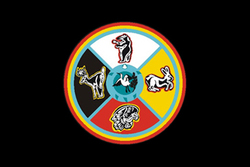Sault Ste. Marie Tribe of Chippewa Indians
| Sault Ste. Marie Tribe of Chippewa Indians of Michigan |
||
|---|---|---|
| Reservation | ||
|
||
| Federally recognized | September 7, 1972 | |
| Headquarters | Sault Ste. Marie | |
| Subdivisions | 5 Units | |
| Government | ||
| • Body | The Sault Ste. Marie Tribe Board of Directors | |
| • Chairman /Chairperson | Aaron Payment | |
| Population (2010)Enrolled members | ||
| • Total | 40,000 | |
| Time zone | ET/EDT | |
| Website | www.saulttribe.com | |
The Sault Ste. Marie Tribe of Chippewa Indians (pronounced "Soo Saint Marie"), commonly shortened to Sault Tribe of Chippewa Indians or the more colloquial Soo Tribe, is a federally recognized Native American tribe in what is now known as Michigan's Upper Peninsula. The tribal headquarters is located within the major city in the region, Sault Ste. Marie on the St. Marys River.
This location was known as Bawating by Chippewa (Ojibwe or Anishinabeg) residents of the region, who had been there prior to Europeans arriving in the mid-to-late 16th century. Bawating, sometimes seen written as Bahweting, is an Ojibwe word meaning "The Gathering Place." The Chippewa participated in fur trading with the French and later British and American traders here.
The Sault Tribe of Chippewa Indians is the largest federally recognized tribe in Michigan, outnumbering the next largest tribes by a scale of about 10 to one. It was recognized in 1972 with five units in seven counties. In 1979 the tribal council included the Mackinac Band as members, nearly doubling its enrollment. The tribe's revenues from casinos has enabled it to establish health centers and invest in education.
The Sault Tribe operates its own government, with regular elections for chairperson and council members. Council members represent the tribe's five units throughout seven counties in Michigan's Upper Peninsula. Over one half of the tribe's enrolled members reside outside the five units, but vote within those established units. They vote in a unit where they have significant ancestral or historic ties.
In 2012 the current chairman Aaron A. Payment was elected by the largest majority in the tribe's modern history. He had first been elected to the Tribal Council in 1996. He was elected as chairman in 2004, defeating a 17-year incumbent. In 2008 he lost his race for re-election to Joe Eitrim, but was re-elected in 2012 and 2016.
The tribe operates its own police department and tribal court.
For hundreds of years preceding modern European contact, the Sault (Soo) Band ancestors were part of the large Lake Superior Band of Chippewa Indians. The Ojibwe (Chippewa in the United States) were known to have migrated over centuries from the Atlantic Coast. They historically spoke the Ojibwe language, one of numerous Algonquian languages.
...
Wikipedia

